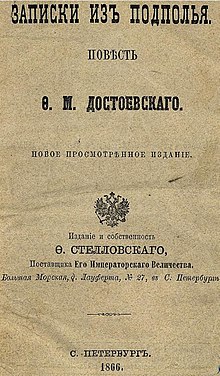 Title page of Russian-language 1866 edition | |
| Author | Fyodor Dostoevsky |
|---|---|
| Original title | Записки изъ подполья |
| Language | Russian |
| Genre | Philosophical fiction |
| Set in | St. Petersburg, c. 1862–64[1] |
| Publisher | Epoch |
Publication date | January–April 1864 |
| Publication place | Russian Empire |
| OCLC | 31124008 |
| 891.73/3 20 | |
| LC Class | PG3326 .Z4 1993 |
Original text | Записки изъ подполья at Russian Wikisource |
| Translation | Notes from Underground at Wikisource |
Notes from Underground (pre-reform Russian: Записки изъ подполья; post-reform Russian: Записки из подполья, Zapíski iz podpólʹya; also translated as Notes from the Underground or Letters from the Underworld)[a] is a novella by Fyodor Dostoevsky first published in the journal Epoch in 1864. It is a first-person narrative in the form of a "confession". The work was originally announced by Dostoevsky in Epoch under the title "A Confession".[3]
The novella presents itself as an excerpt from the memoirs of a bitter, isolated, unnamed narrator (generally referred to by critics as the Underground Man), who is a retired civil servant living in St. Petersburg. Although the first part of the novella has the form of a monologue, the narrator's form of address to his reader is acutely dialogized. According to Mikhail Bakhtin, in the Underground Man's confession "there is literally not a single monologically firm, undissociated word". The Underground Man's every word anticipates the words of an other, with whom he enters into an obsessive internal polemic.[4]
The Underground Man attacks contemporary Russian philosophy, especially Nikolay Chernyshevsky's What Is to Be Done?[5] More generally, the work can be viewed as an attack on and rebellion against determinism: the idea that everything, including the human personality and will, can be reduced to the laws of nature, science and mathematics.[6]
- ^ Reference is made to "Napoleon—the Great and also the present one", setting the story in the reign of Napoleon III (1848–1870); and "the whole of the nineteenth century in which Buckle lived", setting the story after the death of Henry Thomas Buckle (1821–1862).
- ^ Alex Beam, The Feud: Vladimir Nabokov, Edmund Wilson, and the End of a Beautiful Friendship, 2016, ch. 8 "We Are All Pushkinists Now", p. 114
- ^ Dostoevsky, Fyodor (2001). Notes From Underground. Translated and edited by Michael R. Katz (2nd ed.). W.W. Norton. p. 152 (n 3). ISBN 0393976122.
- ^ Bakhtin, Mikhail (1984). Problems of Dostoevsky's Poetics. University of Minnesota Press. pp. 227–28.
- ^ Bird, Robert. "Introduction: Dostoevsky's Wager". Notes from Underground. Translated by Yakim, B. Grand Rapids MI: William B. Eerdmans. pp. vii–xxiv. Quote from p. x: "The views that brought Chernyshevsky to this vision were close to utilitarianism, meaning that actions should be judged in terms of their expediency. Naturally, utilitarians assumed that we can know the standard against which expediency can be measured: usually it was economic well-being. In Chernyshevsky's rational egotism [sic], utlitarianism as a method coincided with socialism as a goal: in essence, it is in everyone's individual self-interest that the whole of society flourish."
- ^ Morson, Gary Saul (1994). Narrative and Freedom. Yale University Press. p. 27.
Cite error: There are <ref group=lower-alpha> tags or {{efn}} templates on this page, but the references will not show without a {{reflist|group=lower-alpha}} template or {{notelist}} template (see the help page).